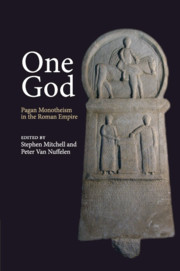Book contents
- Frontmatter
- Contents
- Preface and acknowledgements
- List of abbreviations
- 1 Introduction: the debate about pagan monotheism
- 2 Pagan monotheism as a religious phenomenon
- 3 Pagan ritual and monotheism
- 4 The case for pagan monotheism in Greek and Graeco-Roman antiquity
- 5 Monotheism between cult and politics: the themes of the ancient debate between pagan and Christian monotheism
- 6 The price of monotheism: some new observations on a current debate about late antiquity
- 7 Megatheism: the search for the almighty god and the competition of cults
- 8 Deus deum … summorum maximus (Apuleius): ritual expressions of distinction in the divine world in the imperial period
- 9 Further thoughts on the cult of Theos Hypsistos
- Bibliography
- General index
- Index of authors, works and citations
7 - Megatheism: the search for the almighty god and the competition of cults
Published online by Cambridge University Press: 20 May 2010
- Frontmatter
- Contents
- Preface and acknowledgements
- List of abbreviations
- 1 Introduction: the debate about pagan monotheism
- 2 Pagan monotheism as a religious phenomenon
- 3 Pagan ritual and monotheism
- 4 The case for pagan monotheism in Greek and Graeco-Roman antiquity
- 5 Monotheism between cult and politics: the themes of the ancient debate between pagan and Christian monotheism
- 6 The price of monotheism: some new observations on a current debate about late antiquity
- 7 Megatheism: the search for the almighty god and the competition of cults
- 8 Deus deum … summorum maximus (Apuleius): ritual expressions of distinction in the divine world in the imperial period
- 9 Further thoughts on the cult of Theos Hypsistos
- Bibliography
- General index
- Index of authors, works and citations
Summary
A FEW THOUGHTS ON MONOGAMY AND MONOTHEISM
If I avoid using the term monotheism in my paper in connection with religious trends in the Roman East, it is because I take the word to mean what it says – the exclusive worship of a single god – exactly as monogamy means the state of being married to a single person at a time. Admittedly, monogamy has never prevented humans from having sex with other partners as well, hoping that the one and only would not find out about it – a soft monogamy as it were. It is only with a similar tolerance towards human weakness that we might accept as monotheism the situation in which an individual accepts the existence of a single god, but nevertheless worships many others, either because he thinks it would do no harm, or ‘just in case’. But I wonder whether it really helps us understand the religions of the Roman Empire if we modify the term monotheism beyond recognition through the addition of attributes, such as soft, pagan, inclusive, hierarchical, affective or whatever.
By saying this I do not deny the sporadic existence of genuine monotheistic ideas in intellectual circles. I also do not deny the existence of monotheistic tendencies. But I do find the term pagan monotheism misleading in as much as it reduces the quest for the divine in the imperial period to a question of quantity, whereas the textual evidence for this period shows that we are primarily dealing with a question of quality.
- Type
- Chapter
- Information
- One GodPagan Monotheism in the Roman Empire, pp. 112 - 140Publisher: Cambridge University PressPrint publication year: 2010
- 10
- Cited by



